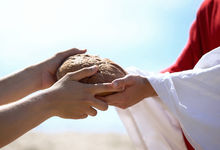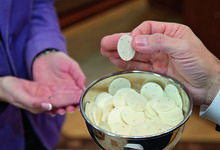The sacraments (20): Too comprehensive for a single word
Lord’s Supper, Communion, the Eucharist: these are some of the most familiar designations for this sacrament. Yet these terms never appear in the Bible in this sense—other words are used instead. This article is all about the wealth of the various designations for the sacrament—and what they mean.

When it comes to the number of times it is mentioned in the Bible, there is a clear frontrunner, namely “breaking of bread” (Greek klasis tou artou). This was originally the term describing the Jewish ritual for beginning a meal. Among Christians, however, it was already during the New Testament period that the term came to be used as a designation for the sacrament which Jesus had instituted shortly before His death. After all, His manner of breaking and dividing up the flatbread was so distinctive that the disciples of Emmaus recognised Him by it.
Only once does the term “Lord’s Supper” (kuriakon deipnon) appear, namely in Paul’s first epistle to the Corinthians, which also refers to the “Lord’s table” (trapeza kyriou). Originally, this term referred to a communal meal that was concluded by a rite of remembrance. Later on, the preceding communal meal came to be separated from the Lord’s Supper, which then became the divine service celebration we know today.
Neither of these two terms managed to prevail as the general designation for this sacrament. However, the two designations used today are also firmly rooted in the Bible—above all the term “supper”. And while the Greek term deipnon might refer to any kind of meal, the fact that wine was served would have made this a festive meal in any event—and in principle, such meals would usually take place in the evening. This is especially clear because the gospels relate that Jesus sat together with His disciples in the evening before His execution.
While the term Lord’s Supper is most at home in the Protestant tradition, the term Eucharist is more familiar in the Catholic world. The Greek word translates to mean “thanksgiving”. This was initially used in reference to the prelude to the meal, as the gospels relate, for example. By the first century AD, however, it had come to be used in reference to the liturgical celebration as a whole. The term Eucharist contains the Greek word charis (grace), which in turn shares its stem with the word chara (joy).
The term “Communion” made its way into modern language from the Greek koinonia via the Latin communio. In translation, the word means “fellowship” or “participation”. And it is in this sense that Paul talks about the Lord’s Supper as a “communion of the blood of Christ” and a “communion of the body of Christ”. Today, this term most often refers to that part of the liturgy when the consecrated wafers are distributed and received.
In the exact same Bible verse (1 Corinthians 10: 16) yet another word emerges, which is also used in reference to the Lord’s Supper, namely the term Eulogy. Here Paul is talking about blessing (eulogia), however, not in the direction from God to man, but rather in the direction of man to God. So it is that today the term is specifically used in reference to the prayer over the bread and wine, in which the Lord is “blessed”, that is, praised and glorified.
This much is clear: Jesus Christ did not leave us with a single clear term when He instituted this sacrament. But what about its format, its effect, and its significance? The answers to these questions also hold a few surprises in store, but that will be the focus of the next part in this series.
Photo: stefania57 - stock.adobe.com

























